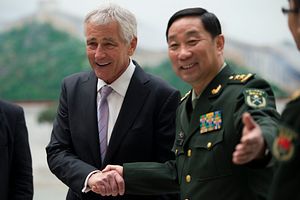Yesterday, I gave a broad overview of the summit between U.S. President Barack Obama and Chinese President Xi Jinping, including worrying signs of a trend toward deep-seated structural and ideological clashes. At the same time, however, both administrations are hedging against the possibility of a drift toward confrontation by trying to deepen ties between their militaries.
During his meeting with Obama, Xi called for a “new type of military relations” between China and the U.S., an offshoot of China’s broader call for a “new type of major power relationship.” In particular, Xi and Obama agreed to expand military exchanges and joint drills and to work on establishing a mutual reporting mechanism for major military operations. The two sides also agreed to continue work on a code of safe conduct for aerial and naval military encounters.
As I’ve noted before, the U.S.-China military relationship is becoming more predictable even as the overall relationship is under stress. In 2010, China called off military talks altogether in response to a U.S. arms sale to Taiwan. Since then, however, high-level talks have become fairly standardized, with the U.S. secretary of defense and chairman of the Joint Chiefs of Staff exchanging annual visits with their Chinese counterparts. At the same time, joint military exercises have become more common. This year, China was invited for the first time to take part in the RIMPAC international maritime exercises held in the waters off of Hawaii. Xi and Obama’s pledge to continue to expand exchanges and joint drills is thus not a surprise.
Progress on a mutual military reporting mechanism will be more difficult, but also of great importance for the overall relationship. With both China and the U.S. frequently deploying forces in the Asia-Pacific region for drills or maneuvers, it’s important for both sides to be aware of impending troop movements. As has been argued in The Diplomat, a missile launch notification deal would also be of great use to eliminating the risk of misinterpretation and miscalculations between the two militaries.
In addition, the U.S. and China have been discussing a code of conduct for military encounters in the air or at sea. The idea of uniform standards of behavior for unplanned encounters has been under serious discussion since US complaints of a “dangerous intercept” by a Chinese fighter jet in August. Given the tensions and mutual distrust that already exist in the relationship, the last thing Washington and Beijing can afford is a repeat of the 2001 Hainan EP-3 incident, where a mid-air collision killed a Chinese pilot and downed a U.S. flight crew.
The need for both a military reporting mechanism and an agreement on “standards of behavior for air and sea military safety” were agreed upon in principle by U.S. Defense Secretary Chuck Hagel and Chinese Defense Minister Chang Wanquan in April. The inclusion of these two agreements in Obama and Xi’s conversation shows these items are still on the agenda.
As U.S.-China relations grow colder, it becomes even more crucial to form a working military relationship. Military-to-military ties are unlikely to be cordial, given the divergent nature of U.S. and Chinese security interests and goals for the region, but as long as lines of communication are functional and standards of behavior are followed the two militaries can help prevent mutual suspicions from actually escalating into conflict. If Xi’s formula of a “new type great power relationship” is formulated to prevent conflict between a rising and established power, it’s actually a “new type of military relations” that will do the trick.

































